
Google Acquires Startup Specializing in Tiny Displays for Augmented Reality
Google’s latest acquisition suggests we may see Google Glass return with much more impressive display technology.
The search giant has reached a deal to acquire a five-year-old startup called Raxium, The Information reports. Raxium is focused on Micro LED technology with a view to offering better augmented reality and mixed reality displays. The company’s website includes details of highly-efficient Micro LEDs measuring roughly 3.5 microns per pixel and offering millions of nits of brightness
Micro LEDs offer many of the same benefits as OLED without some of the drawbacks, notably burn-in. Their small proportions make them well suited for the close-up displays needed for head-mounted displays as they can help reduce the “screen door effect” that occurs when a viewer can see the gaps between pixels.
Just how Google would implement Raxium’s Micro LED technology isn’t entirely clear. Many AR devices don’t situate a traditional display in front of a user’s eyes, instead opting for projection and advanced optics to reflect a display on an otherwise transparent lens. This is effectively how AR glasses like Oppo’s Air Glass and Focals by North (a company Google has also acquired) work. A transparent Micro LED display is a possibility, though.
Google has shown continued interest in AR with the anticipated Project Iris, and it’s likely to face plenty of competition. Microsoft’s HoloLens is still on the market, and Meta has shown serious ambition in the space, even managing to snag dozens of employees from Microsoft. Even Apple is interested in this tech, having acquired a Micro LED display maker back in 2014. In Apple’s case, though, we’re more likely to see its main devices make the switch to Micro LED than AR glasses being announced.
This content was originally published here.

